- Home
- Shirley McKay
Fate and Fortune
Fate and Fortune Read online
Fate & Fortune
A Hew Cullan Mystery
Shirley McKay
for mum and dad with love
Grateful thanks to Lance St John Butler, who, like Hew, is both a scholar and a player of the game of caich. He was kind enough to read through parts of the chapter entitled ‘A Game of Chases’ and advise on its complexities. The mis-hits there are mine, not his.
IF in my weake conceit (for selfe disport)
The world I sample to a Tennis-court,
Where Fate and Fortune daily meet to play,
I doe conceive, I doe not much misse-say.
All manner chance, are Rackets, wherewithall
They bandie men like balls, from wall to wall:
Some over Lyne, to honour and great place;
Some under Lyne, to infame and disgrace;
Some with a cutting stroke, they nimbly send
Into the hazzard placèd at the end
William Lathum
Phyala lachrymarum. Or a few friendly tears … 1634.
Contents
Title Page
Dedication
Acknowledgments
Epigraph
Maps
Lenten Fare
Prayers for the Dead
A Winter’s Tale
Human Remains
The Senzie Fair
A Game of Tricks
Bloodlines
Rites of Passage
The Kindness of Strangers
The Devilmaster
Christian Hall
Wilful Error
Family Ties
A Corbie Messenger
Lines of Inquiry
Catherine
Blackfriars Wynd
The Hanging Man
The Borough Muir
The Bairn’s Part
A Pack of Lies
Devil’s Advocate
Morbus Gallicus
False Impressions
Fast and Loose
Calton Crags
A Game of Chases
Last Will and Testament
The Lion House
About the Author
Copyright
Lenten Fare
St Andrews, Scotland March 1581
In St Andrews, it began to snow, soft at first, insistent, blowing white upon the market place. The wind dropping back, as though tired of its game, allowed the snow to settle on the buiths and stalls, where shopkeepers hurried to withdraw their wares, brushing the flakes from the sills. From his house on the Castlegait, the physician Giles Locke looked out upon the white-rimmed cliffs, gloomily rubbing his beard. A single gull swept from the wall of the castle, circled once and dipped into the salt waves out of sight. Giles watched it in disgust. Five weeks into Lent, and bleak as winter still. He felt his wife’s departure keenly. Only Meg could lighten endless days of fish and coax a hint of sweetness from the rankest kale. Yesterday, in an attempt to cheer his palate, the servant had roasted a herring gull over the fire. The doctor’s belly lurched in recollection. The oiled clumps of seaflesh, tasting of fish, had marked its lowest ebb. In retrospect he thought he would prefer to eat his candle, and for all the light it gave, he might as well. Doctor Locke was out of humour. For how could a man be sanguine, in this raging wind and cold, without the proper comfort of good meat?
In the midst of this melancholic self-diagnosis – wet and windy, he decided, with a surfeit of black bile – he perceived his servant urging at the door, ‘Do you not hear me, professor? There’s someone here would speak with you.’
Mournfully, Giles shook his head. ‘Ah, not today. We must be gone within the hour. Advise him, Paul.’
The servant stamped impatiently. He blew the chill from his fingertips. ‘Aye, and I tried. But yon will not be swayed. A man of means, no doubt. He’s sick, for sure, and draggle damp wi’ snow.’
His master groaned. ‘As we will both be, presently. Bid him call again tomorrow, if he must.’
‘I did not think, sir, you would leave him in the cold. I have him here, withal.’
‘I told you, no …’
But the protest came too late. For Paul had admitted the stranger and the doctor had observed at once, despite himself, that the man looked sick at heart. A man perhaps of thirty-five, dressed for the cold and the fashion, a little tight and pinched about the face. He brought with him a flurry of snow. His cheeks were flushed, and though he stood trembling, Giles hazarded the cause was not the cold.
‘Professor Locke,’ the stranger whispered. ‘Thank the lord!’
‘I pray you leave your name upon the morrow,’ said the doctor brightly, hope in the ascendant, ‘I have business out of town, and do not consult today.’
‘For pity, though,’ the signs were inauspicious, for the man was on his knees, ‘I have come across the Tay in hope of seeing you.’
The doctor sighed. ‘There, there. You come across the water, in this season, sir? And I see you have an ague. You had better stayed at home.’
The stranger had rallied sufficiently, noticed Doctor Locke with sinking heart, to settle in the doctor’s favourite chair. Open-armed, a gossip chair, well plumped and padded with pillows, placed precisely to capture the last of the light, the full of the warmth of the fire. Giles conceded the advantage with reluctance, while the patient gave a deprecating cough.
‘A little fever, aye, a chill about my bones. I lay at the ferry port last night. Yet I must return today. I beg you, sir, a moment of your time.’
The cheeks below their blush were blotched and scabbed. The throat throbbed damp with sweat.
‘Sit closer to the fire,’ surrendered Giles at last. ‘I warn you, I may not delay for long. But my servant here will pour you something hot. A caudle, Paul! What ails you, sir, that you consult so far from home? Are there surgeons none across the Tay?’
‘Surgeons, aye!’ the man said bitterly. He took the cup from Paul. ‘Need your servant stay?’
Doctor Locke considered this. Then he remarked briskly, ‘Indeed, he need not. Paul, you may prepare our cloaks and blankets for the ride. Pray God, the skies will clear. You see, we are embarking on a journey, sir. Ah, well, a moment, then. Why are you come to me?’
The man replied faintly, ‘I have heard your reputation, and have means.’
‘I do not doubt it,’ Giles said dryly. ‘You are a burgess, perhaps?’
‘A merchant, aye.’
‘How long have you been troubled with this fever?’
‘A week, perhaps ten days. It comes and goes.’
Giles tutted. ‘Aye, for sure. What ails you else?’
‘A roughness in the throat, an aching in the bones. It is a common rheum, I doubt, no more,’ the man replied.
‘I doubt there is more,’ Giles said severely, ‘else why did you come to me? Have you suffered this before?’
‘Not that I recall.’
The doctor turned to scrutinise him, curious in the firelight. ‘You say your throat is sore; then will you show your mouth? Come here, that I may see you better in the light. You have not noticed lesions on the tongue? And there,’ Giles prodded gingerly, ‘you do not feel a pain?’
The stranger shook his head.
‘Your forehead is a little warm; you sweat, not overmuch. The fever is light. But the cold air, I protest again, can scarcely help you here.’
The man appeared to brighten. ‘Aye, I doubt tis unseasonably raw,’ he answered eagerly. ‘You recommend the fire?’
‘Indeed I do.’
There was an odd note in the doctor’s voice that served to sink the patient back in gloom. But Giles continued cordially, ‘Will you not remove your gloves, and warm them on the coals? Your journey’s long.
You came on horseback, I presume?’
‘Fine horse, aye. Came across the water. Nor jibbed to cross the ferry, in this wind.’
Giles raised an eyebrow. ‘Fine horse, indeed. No discomfort in the saddle? Sores, contusions in the fundament?’
The man shifted a little, self-consciously. ‘What’s that? A pain in the arse? Well, you know,’ he answered uneasily, Tis a rough enough ride from the ferry.’
‘For sure,’ the doctor soothed. ‘Well, sir, you’ll take off your gloves. Else, as my mother used to say, you will not feel their benefit. I see you have the scab upon your hands.’
‘What scab?’ the man asked, alarmed, inspecting the backs of his hands. ‘I see no scabs.’
‘Here, on the palms.’ Giles turned them round. ‘Tis slight enough, for sure.’
‘A little chapped and chafing from the cold. It’s nothing,’ shrugged his patient.
Giles persisted quietly. Once resigned to consultation, his relentlessness was thorough. ‘May I trouble you to remove your boots? Ah, yes. We see the same here on the feet.’
‘Why are you washing your hands?’ the merchant demanded.
The doctor had withdrawn discreetly to the corner of the room, where washing cloth, tin jug and basin were assembled on the board. He set down his laver and smiled. ‘Tis a habit I acquired from my young wife. We are not married quite the year, and already I am trailing in her ways. She says I reek of physic, when she wants me soft and sweet. You see I am in thrall to her. Ah, this water’s cold! And yourself,’ he made pleasant inquiry, vigorously drying, ‘are you married at all?’
‘Aye, I have a wife,’ the stranger said suspiciously.
‘Children?’
‘Four.’
‘Four children? Then you’re blessed.’ Giles hung the towel on a peg. ‘And you’re a merchant, well-to-do, and have a buith or shop. And doubtless you must venture overseas at times, in search of foreign markets or to fairs?’
‘At times,’ the man conceded.
The doctor nodded thoughtfully. ‘Then you must miss your wife.’
‘What of it, then?’ Some hidden inference appeared to cause offence, for the man rose abruptly, and began to pull on his boots. ‘Thank you; I take up your time.’
‘You have not had what you came for,’ Giles informed him gravely. ‘Was it not a diagnosis you required?’
The man sat down again. ‘The ague, a light fever,’ he repeated. ‘It will pass.’
‘Aye, it will,’ agreed the doctor.
‘Well then?’ the merchant countered desperately.
The doctor stroked his beard. ‘When were you last abroad?’
‘Four months ago. But that can hardly signify.’
‘I fear it can. Four months ago you went abroad, and now you come to me with fever and a raging throat, with lesions and contusions in the mouth – you have not felt them there? Tis no surprise; they cause no pain, in the present stage. You may observe them in the glass. And you have scabs upon your palms, for which you put on gloves.’
‘For the unseasonable cold,’ the patient protested.
Giles continued unperturbed, ‘And on the soles of your feet. These afflictions are externals, and the province of the surgeon’s art, not mine. Nonetheless, since you consult me, you permit me see the place where this began?’
‘I do not understand,’ the merchant whimpered. Unconsciously, perhaps, he had drawn his thighs close in their cushion. His breech was padded, in the fashion, with a mat of hair.
‘Ah,’ the probe was penetrating, ‘but I think you do.’
There was a moment’s silence, before the stranger fumbled with his hose and opened up the buttons at his crotch. ‘Tis nothing,’ he said hoarsely, ‘and has healed.’
The doctor glanced, and then he touched his blade upon a callous nestling on the hairline like a stone. ‘That does not hurt?’
Wordless, the man shook his head.
‘But there has been a chancre, on the pintle shaft. And that, I think,’ the doctor prodded softly, ‘could not escape your notice after all. And while the pustule here was putrid, or in this last fever, did you lie with your wife?’
The patient whispered, ‘No.’
Giles smiled at him approvingly. ‘Good man; you may do up your breeks. Do not bed her awhile, throughout your present sickness. Or any body else,’ he said in afterthought. ‘While the lesions fulminate, I pray you will not deal.’
‘My present sickness?’ The patient looked up at him. ‘There is still hope, then? It may be cured?’
‘Well, we may treat your symptoms for the while. But as I say, the fever will abate, without the need for physic.’
‘I have money here for medicines,’ pressed the merchant, ‘and your time …’
The doctor shook his head. ‘I will not prescribe them. What you suffer from is not within my sphere. I will write you a recommendation to a surgeon here in town, and he is most discreet, for I see your fears and apprehend them. The treatment for your ill is blister, fire and mercury. This is not rooted in the humours, and it cannot be amended from within. Tis not a moral cause,’ he added gently, ‘that I must refuse you. But I will not take your money, where I cannot make a cure.’
‘Then you are alone, sir. For I know of no other, who would not judge or profit from my pain,’ the patient answered miserably. ‘If it were spoken in our town, that I had caught the Spanish fleas, I should be turned out from my business and the kirk. The symptoms will subside, you say?’
‘Aye, but for a while.’
‘And you recommend the surgeon? Tell me sir, for I have heard such savage things about the pox, the curing some claim worse than the affliction. Tell me, is it as bad as they say?’
‘Well,’ Giles cleared his throat. ‘It is true that some of what you may have heard is spoken unkindly, to punish the afflicted for their sins – from a sense of moral outrage, people do exaggerate the cruelty of the cure. But then again, the surgeons sometimes blunt their knives and heat their irons more fiercely than they need to, in self-righteous self-appointment, as the crueller cure. To speak plain, they see their role to punish as they heal. Nay, sir, I see that I frighten you; that is not my intention. Be assured, the surgeon to whom I recommend you is not one such as those, but curious and gentle as his trade permits. I say this but to serve your question, whence the rumour comes. For, I must confess, I know no better course than mercury. I do concede it rigorous, and not always well effective in remitting the disease.’
‘Then there is no hope,’ the man concluded wretchedly.
‘Come, now, there is always hope,’ Giles consoled him kindly. ‘Find yourself an inn in town, a dinner and a bed. Tomorrow, you may brave the surgeon, while the day is fresh. Good luck to you. Have courage, friend. But now I must be gone. Did I not say? I’m going to a funeral.’
The track to Kenly Green had all but disappeared, and they made a hard journey of it. The doctor’s stone-dark mare, Grey Gillat, had grown slow of late, for reasons that were lost on him. The marschal had pronounced her sound, alluding somewhat cryptically to cruel excessive loads. Which was a patent nonsense, Giles protested, for she was a trotting palfrey, nothing more. ‘What loads does she carry?’ he had roared at Paul, who had shrugged and smiled. For Paul himself, he hired an ancient roan, whose going was unsteady when the path was smooth. Therefore, with the white wind in their faces and the promise of a storm, their progress was a little slower than it might have been. To make matters worse, the servant objected, ‘I do not think, sir, they will have the funeral today. The ground is frozen hard. I think we should turn back.’
‘Since when were you required to think?’ Giles retorted crossly. ‘Be grateful that you do not walk.’
‘Twere quicker,’ Paul said reasonably.
Giles shot him a look. ‘We do not go only for the funeral,’ he answered, a little more graciously, ‘but for your mistress’ sake. Take courage, then.’
Paul nodded dubiously.
‘Besides, there will b
e bakemeats,’ his master enthused.
They rode on awhile in silence, as Giles pondered the question of Paul’s new-discovered opinions. He did not doubt their source: they came from Meg. The doctor’s wife was skilled in natural lore and medicines, and with his greater learning they had made a practice of a sort. Mostly, they were complementary; sometimes, though, they felt at odds. It had been her idea to share a little knowledge with the servant, Paul, and gradually she taught him to prepare her simples and receipts. Her reasoning was sound, for ignorance, she claimed, bred fear, and Paul already had suspected them of magic, with alarming consequence. Better then to teach him basic truths. The downside, though, was this emboldened insolence; at times, as Giles suspected, neither of them quite allowed his full respect and mystery. He half expected Paul to set up as a quacksalver himself. Now, as if he read his mind, the servant said, ‘So what was it wrong with him, then?’
Giles reined in the horse, which at her present pace could scarcely make her slow, and turned full in his saddle to glare at him. ‘You allude to what, precisely?’ he demanded coldly.
Unabashed, the man continued, ‘Yon sick merchant, frae Dundee. I’ll warrant twas the pox.’
‘And why would you think that?’
‘Man disna cross the wattir in this weather jist to see your face, as famous as ye are.’
Giles fell silent, spurring on the horse, and Paul sensed that he had crossed the line. ‘Though doubtless, sir, you are well kent,’ he ventured timidly.
‘There are many things,’ the doctor deigned to notice, ‘which you do not know. You made mistakes before, which cost us dear. I bid you, be aware of it.’
The servant flushed. In truth, though, it was not the slight that troubled Doctor Locke. His outrage was more feigned than deeply felt. The thought of his last patient preyed upon his mind. Giles considered all with an open circumspection. He was often sceptical, but seldom proud. He followed his convictions where they led, and was prepared to ask for help wherever it might come the most effectively. Even if, he reasoned wryly, that ran counter to reason and sense. Meg was the case most to point. And yet this particular case he was scarcely inclined to discuss with his wife. This was not the first man he had seen in recent days with syphilis, nor, his instincts told him, would it be the last. And aye, of course, Paul had guessed right. For such a man would not care to be treated close to home.

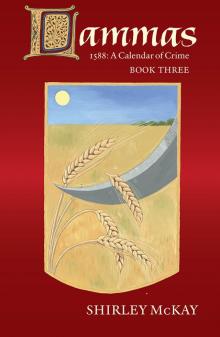 Lammas
Lammas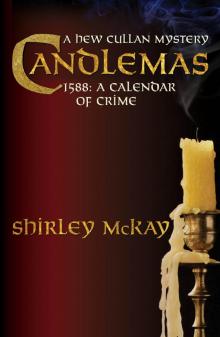 Candlemas
Candlemas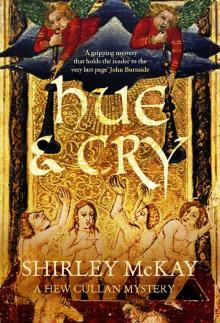 Hue and Cry
Hue and Cry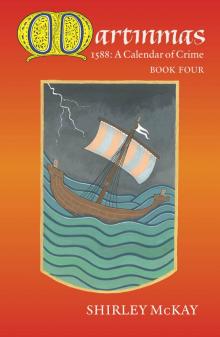 Martinmas
Martinmas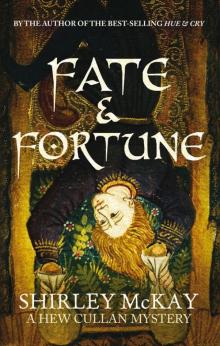 Fate and Fortune
Fate and Fortune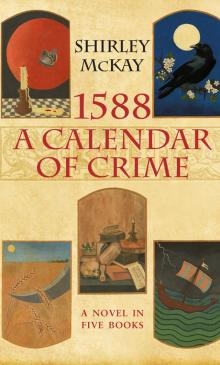 1588 A Calendar of Crime
1588 A Calendar of Crime Time and Tide
Time and Tide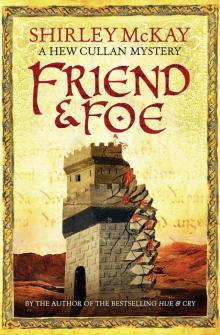 Friend & Foe
Friend & Foe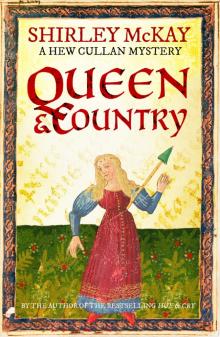 Queen & Country
Queen & Country